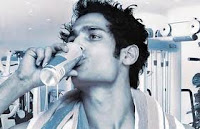700% Increase in Insulin, Elevated Blood Glucose + Identical Cortisol & CK Levels Challenge Usefulness of Intra-Workout High GI Carb Ingestion in Advanced Strength Trainees
To carb-guzzle or not that is the question!
Contrary to Bird et al., who had recruited previously untrained subjects for their study, de Oliveira Quirino's team picked 7 healthy young men (BMI 25.4kg/m²; age 27.3y) who had been training for at least 6 months with a minimum 3 resistance training sessions per week – this is important to note, because it should, for most of you, increase the real-world significance of the data, as I assume that many of you will have been following a similar protocol for probably longer than 6 month, already. What may be less in line with your own exercise regimen, though, is the exact training protocol, which comprised ten exercises for the upper limbs, i.e.
|
|
|
A "substantial" increase in "anabolic hormone activity"?
Now in the absence of concrete data on protein synthesis / degradation, mTOR activity & co and without any information on confounding factors such as an increased training intensity during the carbohydrate trial, it is difficult to provide a conclusive answer to the initially raised question, whether the provision of fast acting carbohydrates during a strength training session would, as the scientists conclude, provide an "additional [benefit] for those engaged in this type of exercise with the aim of hypertrophy”. After all, it may be correct that the findings of the study …
[…] show that carbohydrate ingestion during the course of a training session comprising resistance exercises does not affect catabolic activity, but does increase substantially anabolic hormone activity. (De Oliveira Quirino. 2012)but the „anabolic hormone“ the Brazilian scientists are talking about is insulin, which is beyond doubt among the most "anabolic” hormones in our body, but unfortunately, not exactly muscle specific, as it is simply a matter of fact that skeletal muscle is not the only tissue that’s going to benefit from insulin’s facilitative effects on nutrient uptake (Timmerman. 2010). It thus appears more than reasonable to assume that two other major players in the complex orchestrate of our metabolism will avail themselves of the superfluous amount of glucose that would be floating around in our bloodstream if we mimicked the supplementation protocol in the de Oliveira Quirino study. Their names? Your liver and your body fat stores!
So what are the implications?
 |
| Image 2: Another recently published study by Wax et al. suggest that slow digesting starches can help to maximize workout intensity and volume (read more in my article for Physique Magazine) |
And as far as the increase in insulin is concerned, it appears more than questionable whether the latter would actually exert significant additive effects on muscle protein synthesis or could not even negate the nutrient repartitioning effects of your workouts (Poehlman. 2000; Hawley. 2008) by diverting the obviously superfluous energy to places where you’d rather not have them stored ;-)
A note on the "importance" of insulin to build muscle: One of the most comprehensive reviews on the role of insulin in skeletal muscle anabolism states it quite aptly "the full response of translation initiation and protein synthesis
to either effector is not observed in the absence of a minimal concentration of insulin", but - and this is important - "the amount of insulin required for the effects is low, and a concentration
of the hormone that approximates that observed in fasting animals is sufficient for maximal stimulation." (Kimball. 2002)
Bottom line: Avoid the unnecessary insulin spike from the ingestion of high GI carbs before and/or during a workout, but make sure that you have an ample amount of muscle glycogen before you hit the gym via an adequate total and post-workout carbohydrate intake (the lion's share in form of low GI carbs) and planned carbohydrate re-feeds (esp. for low carbers). This practice will not necessarily augment post-exercise protein synthesis (cf. "Glycogen-Free Muscle Growth"), but it is certainly going to help you to increase or at least maintain your workout intensity and overall training volume (Wax. 2012).References:
- Bird SP, Tarpenning KM, Marino FE. Liquid carbohydrate/essential amino acid ingestion during a short-term bout of resistance exercise suppresses myofibrillar protein degradation. Metabolism. 2006 May;55(5):570-7.
- de Oliveira Quirino EL, da Conceição Rodrigues Gonçalves M, de Oliveira CVC, Porto dos Santos E, Silva AS. Influence of carbohydrate supplementation during resistance training on concentrations of the hormones cortisol and insulin. Sport Sci Health (2012) 7:93–97
- Hawley JA, Lessard SJ. Exercise training-induced improvements in insulin action. Acta Physiol (Oxf). 2008 Jan;192(1):127-35. Review.
- Kimball SR, Farrell PA, Jefferson LS. Invited Review: Role of insulin in translational control of protein synthesis in skeletal muscle by amino acids or exercise. J Appl Physiol. 2002 Sep;93(3):1168-80.
- Poehlman ET, Dvorak RV, DeNino WF, Brochu M, Ades PA. Effects of resistance training and endurance training on insulin sensitivity in nonobese, young women: a controlled randomized trial. J Clin Endocrinol Metab. 2000 Jul;85(7):2463-8.
- Timmerman KL, Lee JL, Dreyer HC, Dhanani S, Glynn EL, Fry CS, Drummond MJ, Sheffield-Moore M, Rasmussen BB, Volpi E. Insulin stimulates human skeletal muscle protein synthesis via an indirect mechanism involving endothelial-dependent vasodilation and mammalian target of rapamycin complex 1 signaling. J Clin Endocrinol Metab. 2010 Aug;95(8):3848-57.
- Wax B, Brown SP, Webb HE, Kavazis AN. Effects of carbohydrate supplementation on force output and time to exhaustion during static leg contractions superimposed with electromyostimulation. J Strength Cond Res. 2012 Jun;26(6):1717-23.




